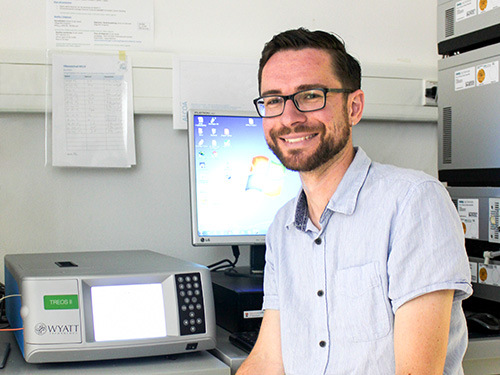Featured Customer: Thomas Müller, Ph.D.

The drive to cure life-threatening disease is a key motivator for many Wyatt customers. At Affimed, Thomas Müller has found that SEC-MALS is a central technology in the development and production of novel biopharmaceuticals, which include challenging tetravalent bispecifics for carrying out advanced immuno-oncology therapies.
Please tell us about your background: where you grew up, studied and the field you chose.
I grew up in a small town in Southern Germany and pursued an education in biotechnology, a field in which I had always a strong interest. During my studies, I gained expertise in human genetics, immunology and protein chemistry, and was part of several working groups at the Institute of Medical Genetics, UKT Tübingen, and the Department of Genetics and Molecular Medicine, King’s College London. I graduated from Mannheim University of Applied Sciences with a Master’s of Science in Bioprocess Development with a focus on protein purification and analysis.
What led you to choose those fields? What are the challenges that excite you?
I have always had a strong desire to be part of a team that works on innovative therapeutic solutions for patients suffering from life-threatening diseases. This is why I decided to join Affimed GmbH, in Heidelberg, Germany, which is a clinical-stage immuno-oncology (IO) company.
What excites me most about my work at Affimed is the development of innovative technologies that make a real difference to cancer patients and their families, conceived of by thinking outside the box. Our modular and versatile ROCK® (Redirected Optimized Cell Killing) platform generates proprietary, next-generation antibody formats. These tetravalent/bispecific innate cell engagers are designed to bring innate immune cells—natural killer cells or macrophages—into proximity to cancer cells, then trigger a signal cascade that leads to the destruction of these cancer cells. We aim to actualize the next great advancement in IO, by creating novel medicines that restore to patients their innate ability to fight cancer.
What does your current position entail? How does it tie into your previous experience, and where is it going?
My current position is Lab Head of our Protein Chemistry group. I manage a fantastic team tasked with chromatographic purification and characterization of various ROCK engager formats, engineered by combining different modular components. In addition, we continue to advance the ROCK platform itself through the development and improvement of analytical and purification methods.
In what context did you first learn about light scattering and Wyatt instruments?
We screen a lot of different molecular antibody formats on a daily basis, so we need to analyze and monitor assembly of our ROCK engager molecules. Therefore, we were looking for a method / instrument which enables rapid determination of the molecular weight of proteins in their native state at any timepoint in our purification process. I had already heard of Wyatt Technology, but was not aware of their expertise before this search.
How has your Wyatt instrumentation contributed to your research and development studies?
We purchased a miniDAWN® in 2018, as an expansion of our HPLC system. We now use the miniDAWN for SEC-MALS analysis, which for us has become a standard method in the lab, both for analysis of final protein samples and in-process controls. Based on this experience, we are evaluating a further addition of an Optilab® online refractive index detector to increase data accuracy and flexibility for measuring unknown sample components by SEC-MALS.

We use the miniDAWN for SEC-MALS analysis, which for us has become a standard method, both for analysis of final protein samples and in-process controls.
